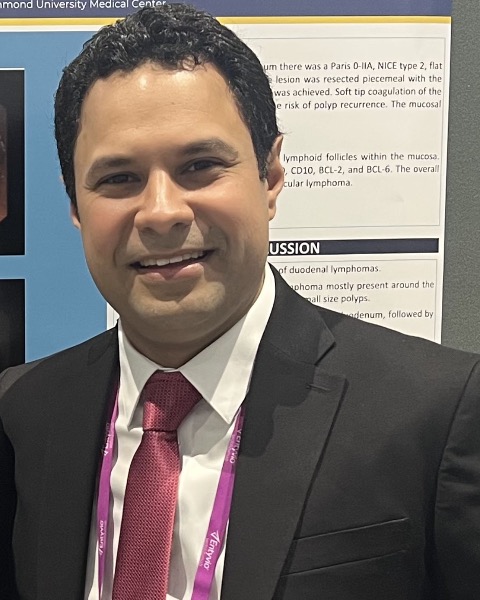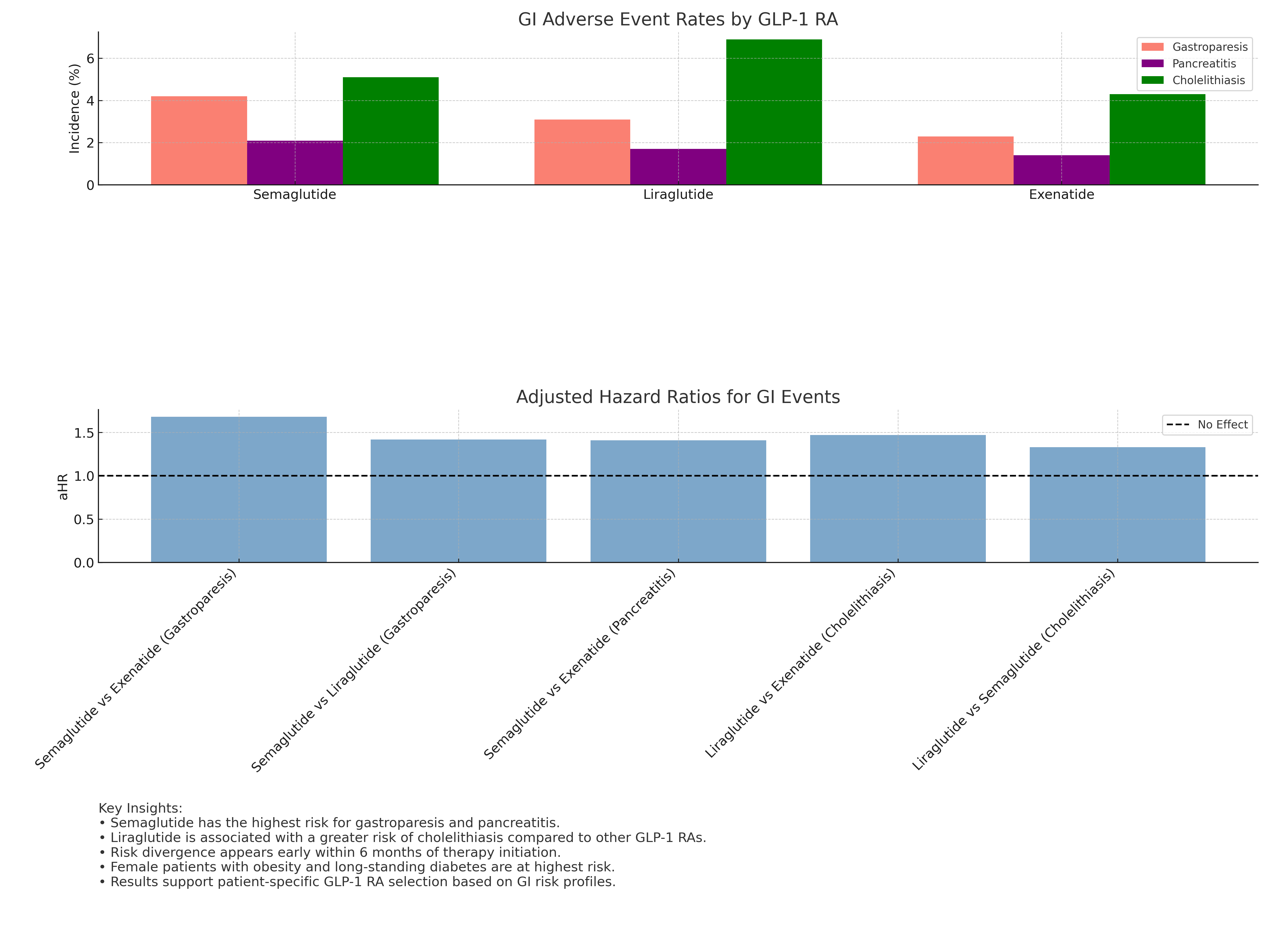Tuesday Poster Session
Category: Diet, Nutrition, and Obesity
P4824 - Comparative Risk of Gastrointestinal Adverse Events Among GLP-1 Receptor Agonists: A Real-World Multicenter Study
Tuesday, October 28, 2025
10:30 AM - 4:00 PM PDT
Location: Exhibit Hall

Ahmed Salem, MD
Maimonides Medical Center
Brooklyn, NY
Presenting Author(s)
Ahmed Salem, MD1, Sarah Meribout, MD1, Hazem Abosheaishaa, MD2, Mohammed Abusuliman, MD3, Islam Mohamed, MD4, Syed Mujtaba Baqir, MD1, Rajdeep Singh, MD5, Neha Sharma, MD1, Fatima Khan, MD1, Mohamed Eldesouki, MD6, Omar Abdelhalim, MD7, Joseph Menand, MD1, MariaLisa Itzoe, DO, MPH1, Samantha Ehrlich, MD1, Abdallah Hussein, MD8, Tanuj Chokshi, MD1, Avleen Kaur, MD9, Carla Barberan Parraga, MD1, Nakul Mahajan, MBBS1, Samar Pal S. Sandhu, MBBS1, Islam Rajab, MD10, Bani Roland, MD11, Yuriy Tsirlin, MD1, Gerard Mullin, MD12, Mohammad Alomari, MD13, Sherif E. Elhanafi, MD14, Aaron Z. Tokayer, MD, MHS1
1Maimonides Medical Center, Brooklyn, NY; 2Mount Sinai West, Icahn School of Medicine at Mount Sinai, Queens, NY; 3Henry Ford Hospital, Detroit, MI; 4University of Missouri Columbia, Columbia, MO; 5PEACEHEALTH, Longview, WA; 6Saint Michael's Medical Center, New York Medical College, Newark, NJ; 7Icahn School of Medicine at Mount Sinai, Queens, NY; 8Virtua Our Lady of Lourdes Hospital, Camden, NJ; 9SUNY Upstate Medical University, Syracuse, NY; 10St. Joseph's University Medical Center, Paterson, NJ; 11Brooklyn VA Medical Center, Brooklyn, NY; 12Johns Hopkins University School of Medicine, Baltimore, MD; 13University of Arkansas, Little Rock, AR; 14Texas Tech University Health Sciences Center, El Paso, TX
Introduction: GLP-1 receptor agonists (GLP-1 RAs) have transformed the management of type 2 diabetes and obesity. However, concerns remain regarding gastrointestinal (GI) adverse effects, including gastroparesis, pancreatitis, and gallstone formation. Comparative real-world data across individual agents remain limited.
Aim:
To compare the incidence of GI adverse events among patients prescribed different GLP-1 RAs using a large, multicenter electronic health record (EHR) database.
Methods: This retrospective cohort study used TriNetX, a U.S. research network of 90+ healthcare systems. Adults (≥18 years) with type 2 diabetes (ICD-10 E11) initiating semaglutide, liraglutide, or exenatide from Jan 2018 to Dec 2023 were included. Patients with prior gastroparesis, pancreatitis, cholelithiasis, pancreatic cancer, cirrhosis, or GLP-1 RA use in the prior year were excluded.
Cohorts were matched 1:1:1 using propensity scores, adjusting for age, sex, BMI, HbA1c, diabetes duration, comorbidities (CKD, IBD, gallbladder disease, alcohol use), and medications (metformin, insulin, SGLT2 inhibitors, PPIs). Primary outcomes: new-onset gastroparesis, acute pancreatitis, and cholelithiasis. Cox models estimated adjusted hazard ratios (aHRs) with 95% confidence intervals (CIs).
Results: 42,313 eligible patients: semaglutide (n=19,870), liraglutide (n=14,621), exenatide (n=7,822). After matching, 7,000 patients per group (21,000 total) were retained with balanced covariates. Median follow-up: 14.3 months.
Highest risks were observed in females with BMI ≥30 and diabetes >10 years. Kaplan-Meier curves showed early divergence by 6 months.
Discussion: GI adverse event risk differs across GLP-1 RAs. Semaglutide showed higher risk for gastroparesis and pancreatitis; liraglutide had the highest cholelithiasis risk. These findings support individualized therapy based on patient-specific GI risk.

Figure: • Semaglutide has the highest risk for gastroparesis and pancreatitis.
• Liraglutide is associated with a greater risk of cholelithiasis compared to other GLP-1 RAs.
• Risk divergence appears early within 6 months of therapy initiation.
• Female patients with obesity and long-standing diabetes are at highest risk.
• Results support patient-specific GLP-1 RA selection based on Gl risk
Disclosures:
Ahmed Salem indicated no relevant financial relationships.
Sarah Meribout indicated no relevant financial relationships.
Hazem Abosheaishaa indicated no relevant financial relationships.
Mohammed Abusuliman indicated no relevant financial relationships.
Islam Mohamed indicated no relevant financial relationships.
Syed Mujtaba Baqir indicated no relevant financial relationships.
Rajdeep Singh indicated no relevant financial relationships.
Neha Sharma indicated no relevant financial relationships.
Fatima Khan indicated no relevant financial relationships.
Mohamed Eldesouki indicated no relevant financial relationships.
Omar Abdelhalim indicated no relevant financial relationships.
Joseph Menand indicated no relevant financial relationships.
MariaLisa Itzoe indicated no relevant financial relationships.
Samantha Ehrlich indicated no relevant financial relationships.
Abdallah Hussein indicated no relevant financial relationships.
Tanuj Chokshi indicated no relevant financial relationships.
Avleen Kaur indicated no relevant financial relationships.
Carla Barberan Parraga indicated no relevant financial relationships.
Nakul Mahajan indicated no relevant financial relationships.
Samar Pal Sandhu indicated no relevant financial relationships.
Islam Rajab indicated no relevant financial relationships.
Bani Roland indicated no relevant financial relationships.
Yuriy Tsirlin indicated no relevant financial relationships.
Gerard Mullin indicated no relevant financial relationships.
Mohammad Alomari indicated no relevant financial relationships.
Sherif Elhanafi indicated no relevant financial relationships.
Aaron Tokayer indicated no relevant financial relationships.
Ahmed Salem, MD1, Sarah Meribout, MD1, Hazem Abosheaishaa, MD2, Mohammed Abusuliman, MD3, Islam Mohamed, MD4, Syed Mujtaba Baqir, MD1, Rajdeep Singh, MD5, Neha Sharma, MD1, Fatima Khan, MD1, Mohamed Eldesouki, MD6, Omar Abdelhalim, MD7, Joseph Menand, MD1, MariaLisa Itzoe, DO, MPH1, Samantha Ehrlich, MD1, Abdallah Hussein, MD8, Tanuj Chokshi, MD1, Avleen Kaur, MD9, Carla Barberan Parraga, MD1, Nakul Mahajan, MBBS1, Samar Pal S. Sandhu, MBBS1, Islam Rajab, MD10, Bani Roland, MD11, Yuriy Tsirlin, MD1, Gerard Mullin, MD12, Mohammad Alomari, MD13, Sherif E. Elhanafi, MD14, Aaron Z. Tokayer, MD, MHS1. P4824 - Comparative Risk of Gastrointestinal Adverse Events Among GLP-1 Receptor Agonists: A Real-World Multicenter Study, ACG 2025 Annual Scientific Meeting Abstracts. Phoenix, AZ: American College of Gastroenterology.
1Maimonides Medical Center, Brooklyn, NY; 2Mount Sinai West, Icahn School of Medicine at Mount Sinai, Queens, NY; 3Henry Ford Hospital, Detroit, MI; 4University of Missouri Columbia, Columbia, MO; 5PEACEHEALTH, Longview, WA; 6Saint Michael's Medical Center, New York Medical College, Newark, NJ; 7Icahn School of Medicine at Mount Sinai, Queens, NY; 8Virtua Our Lady of Lourdes Hospital, Camden, NJ; 9SUNY Upstate Medical University, Syracuse, NY; 10St. Joseph's University Medical Center, Paterson, NJ; 11Brooklyn VA Medical Center, Brooklyn, NY; 12Johns Hopkins University School of Medicine, Baltimore, MD; 13University of Arkansas, Little Rock, AR; 14Texas Tech University Health Sciences Center, El Paso, TX
Introduction: GLP-1 receptor agonists (GLP-1 RAs) have transformed the management of type 2 diabetes and obesity. However, concerns remain regarding gastrointestinal (GI) adverse effects, including gastroparesis, pancreatitis, and gallstone formation. Comparative real-world data across individual agents remain limited.
Aim:
To compare the incidence of GI adverse events among patients prescribed different GLP-1 RAs using a large, multicenter electronic health record (EHR) database.
Methods: This retrospective cohort study used TriNetX, a U.S. research network of 90+ healthcare systems. Adults (≥18 years) with type 2 diabetes (ICD-10 E11) initiating semaglutide, liraglutide, or exenatide from Jan 2018 to Dec 2023 were included. Patients with prior gastroparesis, pancreatitis, cholelithiasis, pancreatic cancer, cirrhosis, or GLP-1 RA use in the prior year were excluded.
Cohorts were matched 1:1:1 using propensity scores, adjusting for age, sex, BMI, HbA1c, diabetes duration, comorbidities (CKD, IBD, gallbladder disease, alcohol use), and medications (metformin, insulin, SGLT2 inhibitors, PPIs). Primary outcomes: new-onset gastroparesis, acute pancreatitis, and cholelithiasis. Cox models estimated adjusted hazard ratios (aHRs) with 95% confidence intervals (CIs).
Results: 42,313 eligible patients: semaglutide (n=19,870), liraglutide (n=14,621), exenatide (n=7,822). After matching, 7,000 patients per group (21,000 total) were retained with balanced covariates. Median follow-up: 14.3 months.
Gastroparesis: semaglutide 4.2%, liraglutide 3.1%, exenatide 2.3%
Semaglutide vs exenatide: aHR 1.68 (1.29–2.18), p< 0.001
Semaglutide vs liraglutide: aHR 1.42 (1.17–1.74), p=0.003
Pancreatitis: semaglutide 2.1%, liraglutide 1.7%, exenatide 1.4%
Semaglutide vs exenatide: aHR 1.41 (1.07–1.86), p=0.015
Cholelithiasis: liraglutide 6.9%, semaglutide 5.1%, exenatide 4.3%
Liraglutide vs exenatide: aHR 1.47 (1.12–1.91), p=0.004
Liraglutide vs semaglutide: aHR 1.33 (1.01–1.76), p=0.038
Highest risks were observed in females with BMI ≥30 and diabetes >10 years. Kaplan-Meier curves showed early divergence by 6 months.
Discussion: GI adverse event risk differs across GLP-1 RAs. Semaglutide showed higher risk for gastroparesis and pancreatitis; liraglutide had the highest cholelithiasis risk. These findings support individualized therapy based on patient-specific GI risk.

Figure: • Semaglutide has the highest risk for gastroparesis and pancreatitis.
• Liraglutide is associated with a greater risk of cholelithiasis compared to other GLP-1 RAs.
• Risk divergence appears early within 6 months of therapy initiation.
• Female patients with obesity and long-standing diabetes are at highest risk.
• Results support patient-specific GLP-1 RA selection based on Gl risk
Disclosures:
Ahmed Salem indicated no relevant financial relationships.
Sarah Meribout indicated no relevant financial relationships.
Hazem Abosheaishaa indicated no relevant financial relationships.
Mohammed Abusuliman indicated no relevant financial relationships.
Islam Mohamed indicated no relevant financial relationships.
Syed Mujtaba Baqir indicated no relevant financial relationships.
Rajdeep Singh indicated no relevant financial relationships.
Neha Sharma indicated no relevant financial relationships.
Fatima Khan indicated no relevant financial relationships.
Mohamed Eldesouki indicated no relevant financial relationships.
Omar Abdelhalim indicated no relevant financial relationships.
Joseph Menand indicated no relevant financial relationships.
MariaLisa Itzoe indicated no relevant financial relationships.
Samantha Ehrlich indicated no relevant financial relationships.
Abdallah Hussein indicated no relevant financial relationships.
Tanuj Chokshi indicated no relevant financial relationships.
Avleen Kaur indicated no relevant financial relationships.
Carla Barberan Parraga indicated no relevant financial relationships.
Nakul Mahajan indicated no relevant financial relationships.
Samar Pal Sandhu indicated no relevant financial relationships.
Islam Rajab indicated no relevant financial relationships.
Bani Roland indicated no relevant financial relationships.
Yuriy Tsirlin indicated no relevant financial relationships.
Gerard Mullin indicated no relevant financial relationships.
Mohammad Alomari indicated no relevant financial relationships.
Sherif Elhanafi indicated no relevant financial relationships.
Aaron Tokayer indicated no relevant financial relationships.
Ahmed Salem, MD1, Sarah Meribout, MD1, Hazem Abosheaishaa, MD2, Mohammed Abusuliman, MD3, Islam Mohamed, MD4, Syed Mujtaba Baqir, MD1, Rajdeep Singh, MD5, Neha Sharma, MD1, Fatima Khan, MD1, Mohamed Eldesouki, MD6, Omar Abdelhalim, MD7, Joseph Menand, MD1, MariaLisa Itzoe, DO, MPH1, Samantha Ehrlich, MD1, Abdallah Hussein, MD8, Tanuj Chokshi, MD1, Avleen Kaur, MD9, Carla Barberan Parraga, MD1, Nakul Mahajan, MBBS1, Samar Pal S. Sandhu, MBBS1, Islam Rajab, MD10, Bani Roland, MD11, Yuriy Tsirlin, MD1, Gerard Mullin, MD12, Mohammad Alomari, MD13, Sherif E. Elhanafi, MD14, Aaron Z. Tokayer, MD, MHS1. P4824 - Comparative Risk of Gastrointestinal Adverse Events Among GLP-1 Receptor Agonists: A Real-World Multicenter Study, ACG 2025 Annual Scientific Meeting Abstracts. Phoenix, AZ: American College of Gastroenterology.
